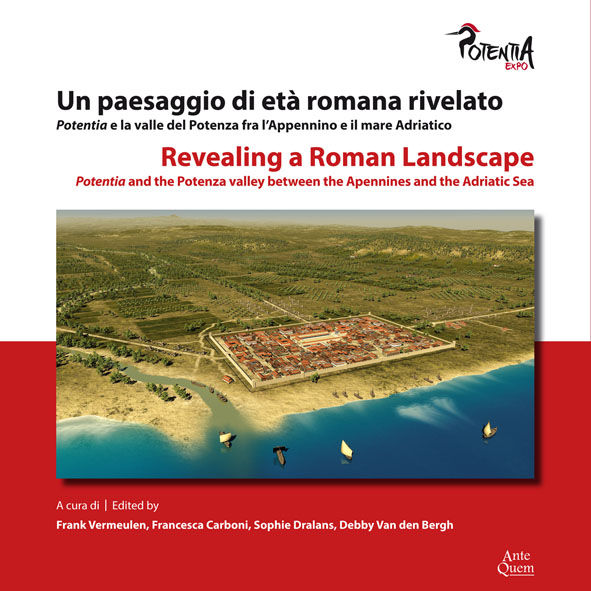
Frank Vermeulen, Francesca Carboni, Sophie Dralans, Debby Van den Bergh (a cura di) / (eds.)
Un paesaggio di età romana rivelato / Revealing a Roman Landscape
Potentia e la valle del Potenza fra l'Appennino e il mare Adriatico / Potentia and the Potenza valley between the Apennines and the Adriatic Sea
2017
formato 21 x 21 cm; ril. bros.
128 pagine, a colori
testi in italiano e inglese
ISBN 978-88-7849-123-6
€ 14,00
Aggiungi al carrello Un paesaggio che si legge come un libro di storia, quello della valle marchigiana del fiume Potenza, importante corridoio di comunicazione tra gli Appennini e l’Adriatico fin dall’antichità. Grazie soprattutto ai recenti sistemi di indagine non invasiva e alle prospezioni intensive condotte dall’Università di Gent, si dispone oggi di una straordinaria quantità di informazioni che, unite a quelle note dalle precedenti e più tradizionali ricerche archeologiche, delineano in modo esemplare l’impatto della romanizzazione su questi territori e l’interazione culturale tra Romani, Piceni e altre popolazioni che abitarono la zona. Una particolare attenzione è riservata alla città costiera di Potentia, colonia fondata all’inizio del II secolo a.C. che, con la sua posizione cruciale tra la valle e il mare, fu essenziale per la formazione di questo antico paesaggio romano.
A landscape that reads like a history book, the one of the of the Potenza River valley in Marche, a major communication corridor between the Apennines and the Adriatic since Antiquity. Thanks in particular to the recent non-invasive investigations and intensive surveys conducted by Ghent University, there is today an extraordinary amount of information that, coupled with the results from previous and more traditional archaeological investigations, exemplify the impact of Romanization on these territories and of cultural interaction between Romans, Picenes and other populations who lived in the area. Particular attention is paid to the coastal town of Potentia, a colony founded at the beginning of the 2nd century BC. which, thanks to its crucial position between the valley and the sea, was essential for the formation of this ancient Roman landscape.
A landscape that reads like a history book, the one of the of the Potenza River valley in Marche, a major communication corridor between the Apennines and the Adriatic since Antiquity. Thanks in particular to the recent non-invasive investigations and intensive surveys conducted by Ghent University, there is today an extraordinary amount of information that, coupled with the results from previous and more traditional archaeological investigations, exemplify the impact of Romanization on these territories and of cultural interaction between Romans, Picenes and other populations who lived in the area. Particular attention is paid to the coastal town of Potentia, a colony founded at the beginning of the 2nd century BC. which, thanks to its crucial position between the valley and the sea, was essential for the formation of this ancient Roman landscape.
Testi di / texts by: Francesca Carboni, Cristina Corsi, Marco Destro, Sophie Dralans, Stefano Finocchi, Adeline Hoffelinck, Maurizio Landolfi, Sadi Maréchal, Patrick Monsieur, Gianfranco Paci, Edvige Percossi, Roberto Perna, Emanuela Stortoni, Devi Taelman, Dimitri Van Limbergen, Frank Vermeulen.







